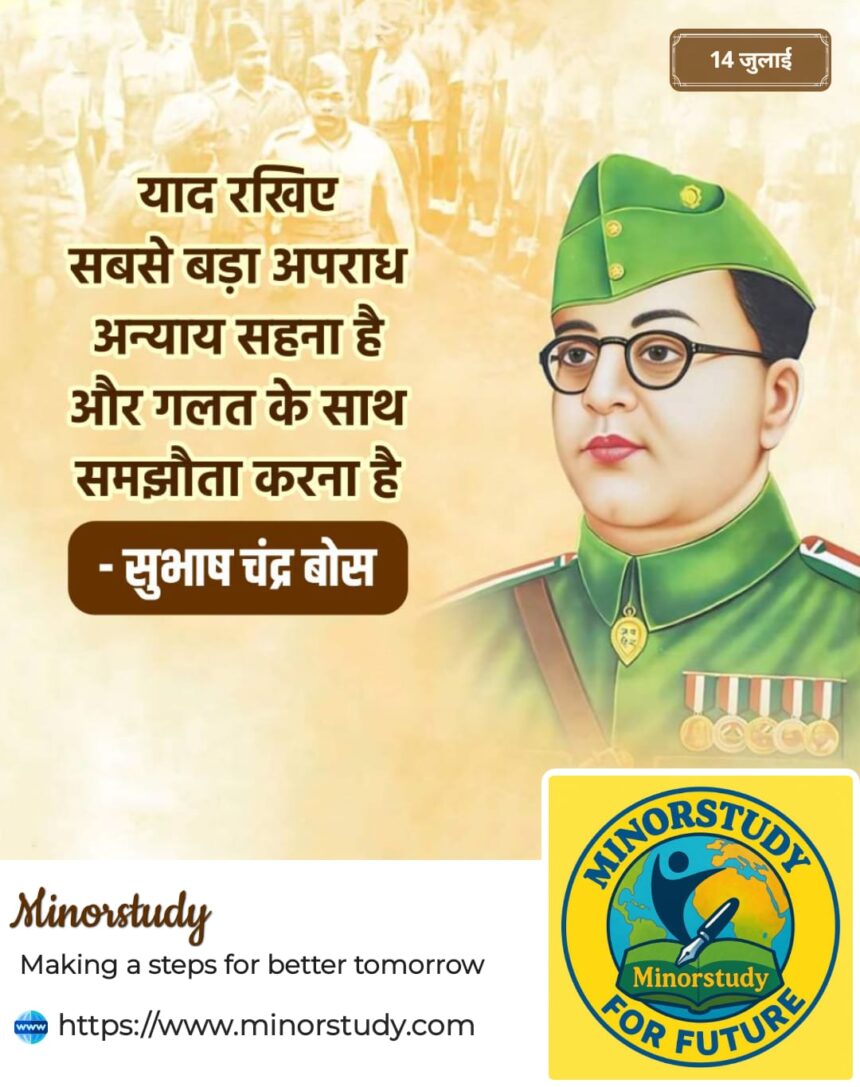7 Bold Lessons from Subhash Chandra Bose’s Most Fearless Quote That Refuse to Accept Injustice
“Remember the greatest crime is to endure injustice and compromise with wrong.”
— Netaji Subhash Chandra Bose
This timeless and fiery declaration by Netaji Subhash Chandra Bose isn’t just a call for revolution—it’s a wake-up call for the soul. In a world where silence often becomes complicity, Bose’s warning remains powerfully relevant: enduring injustice is not noble, it’s criminal.
- 📖 History and Background of the Quote
- 📅 Timeline of the Quote’s Relevance
- 📌 7 Bold Lessons This Quote Teaches the World
- 1. Silence in the Face of Wrong is a Crime
- 2. True Patriotism Means Refusing to Accept Corruption
- 3. Courage is Moral, Not Just Physical
- 4. Everyday Injustices Need Everyday Heroes
- 5. Don’t Romanticize Endurance
- 6. Never Compromise with Evil for Comfort
- 7. Justice Begins with Personal Responsibility
- 🧠 Significance in Daily Life
- 🌍 Impact on Indian Freedom Movement
- 🕊️ Observance and Reverence
- 💬 Frequently Asked Questions (FAQs)
- Q1. Why did Subhash Chandra Bose say this quote?
- Q2. How is this quote relevant today?
- Q3. How can youth live by this quote?
- Q4. Isn’t non-violence better than resistance?
- Q5. Is this quote applicable outside politics?
- 🌺 Wishing Message Inspired by Netaji’s Vision
- 🧭 Conclusion: A Quote That Dares You to Live Boldly
In this comprehensive article, we’ll explore the history, context, significance, and daily relevance of this quote—showing how it can inspire action, courage, and dignity in today’s world.
📖 History and Background of the Quote
This iconic quote reflects the ideological core of Subhash Chandra Bose’s philosophy. Unlike leaders who promoted gradual reform or passive resistance, Bose believed in direct action, complete independence, and bold resistance.
The quote likely comes from speeches delivered during:
The formation of the Indian National Army (INA)
His leadership of the Azad Hind Government
His radio broadcasts from Germany and Japan motivating Indians to fight back
Netaji’s worldview was shaped by:
Inspiration from revolutionary leaders like Giuseppe Garibaldi and Lenin
First-hand experience of British atrocities
A belief that freedom is never given—it is seized
His quote condemns apathy, fearful silence, and moral compromise, which he saw as tools that strengthened the oppressor.
📅 Timeline of the Quote’s Relevance
| Year | Context |
|---|---|
| 1939–1943 | Bose breaks with Gandhi and INC over non-violence policies |
| 1943 | Forms INA and proclaims Azad Hind Sarkar |
| 1945 | INA trials stir anti-British sentiment across India |
| Post-1947 | His quote becomes symbolic in anti-corruption and resistance movements |
| Modern Day | Activists and youth cite it to challenge injustice in all forms |
📌 7 Bold Lessons This Quote Teaches the World
1. Silence in the Face of Wrong is a Crime
When we witness injustice and say nothing, we become enablers. Bose’s quote turns the idea of “tolerance” upside down.
🎯 “What you allow, you promote.”
2. True Patriotism Means Refusing to Accept Corruption
Whether in politics, institutions, or workplaces—accepting the wrong to maintain comfort is cowardice, not peace.
🛑 “Standing by the truth sometimes means standing alone.”
3. Courage is Moral, Not Just Physical
You don’t need to go to war. But raising your voice in a meeting, filing a complaint, or defending someone—that’s courage too.
🔥 “Speak, even if your voice shakes.”
4. Everyday Injustices Need Everyday Heroes
Bullying in school
Discrimination at work
Exploitation in businesses
All require moral resistance.
✊ “Injustice thrives where silence rules.”
5. Don’t Romanticize Endurance
Many cultures glorify suffering. Bose challenges that. Enduring injustice isn’t virtue—it’s betrayal of justice.
⚖️ “If injustice becomes law, resistance becomes duty.”
6. Never Compromise with Evil for Comfort
Often, people accept minor wrongs to avoid discomfort. But small compromises create big monsters.
🚫 “One wrong accepted quietly invites a thousand more.”
7. Justice Begins with Personal Responsibility
It’s easy to blame leaders. But every citizen has a role. Bose’s quote reminds us: change begins within.
🙌 “Raise your words, not your hands—unless both are needed.”
🧠 Significance in Daily Life
🏛️ In Society:
The quote empowers citizens to stand against oppression, casteism, communalism, and authoritarianism.
Sparks activism and civic engagement.
👩🏫 In Education:
Teaches students to question bias, challenge injustice, and promote equality in class and society.
💼 In Workplaces:
Encourages employees to call out unethical practices, discrimination, and toxic work cultures.
🏠 At Home:
Promotes fairness, gender equality, and respect by eliminating silent tolerance of wrongs.
🌍 Impact on Indian Freedom Movement
Bose’s quote wasn’t just rhetorical philosophy—he lived by it:
Resigned from ICS—a prestigious British job, calling it slavery
Escaped British house arrest to seek international support
Built the INA from scratch to militarily challenge the empire
Refused any settlement less than full independence
His quote inspired countless young Indians to act decisively, not just dream passively.
🕊️ Observance and Reverence
Netaji’s ideas are honored in:
Netaji Jayanti (23rd January every year)
INA commemorations and parades
Political speeches across ideological lines
History books, slogans, and protests
But true observance is in action:
➡️ Speaking up,
➡️ Raising questions,
➡️ Not bowing to wrong.
💬 Frequently Asked Questions (FAQs)
Q1. Why did Subhash Chandra Bose say this quote?
A: He believed that tolerating injustice perpetuates it. For Bose, freedom could never be gained by waiting or compromising.
Q2. How is this quote relevant today?
A: From social inequality to political corruption, it applies wherever truth is crushed by power or silence.
Q3. How can youth live by this quote?
A: By:
Speaking out against peer bullying
Fighting for climate justice
Refusing unethical shortcuts
Questioning status quo
Q4. Isn’t non-violence better than resistance?
A: Bose didn’t reject peace, but emphasized that action is necessary when injustice becomes intolerable.
Q5. Is this quote applicable outside politics?
A: Absolutely. It applies in work, family, education, legal systems, and digital spaces where wrongs are normalized.
🌺 Wishing Message Inspired by Netaji’s Vision
🌼 May you never lower your voice before injustice.
May you have the strength to choose what’s right over what’s easy.
May the fire of Subhash Chandra Bose’s truth forever guide your conscience. 🌼
🧭 Conclusion: A Quote That Dares You to Live Boldly
Subhash Chandra Bose’s quote is not for the faint-hearted. It’s for the rebels with a cause, the truth-seekers, the justice warriors.
In a world craving convenience, this quote demands courage.
🔔 “Do not endure injustice. Do not negotiate with wrong. For in silence, evil thrives.”
If you’ve ever hesitated to raise your voice, remember Netaji’s words—and rise.








